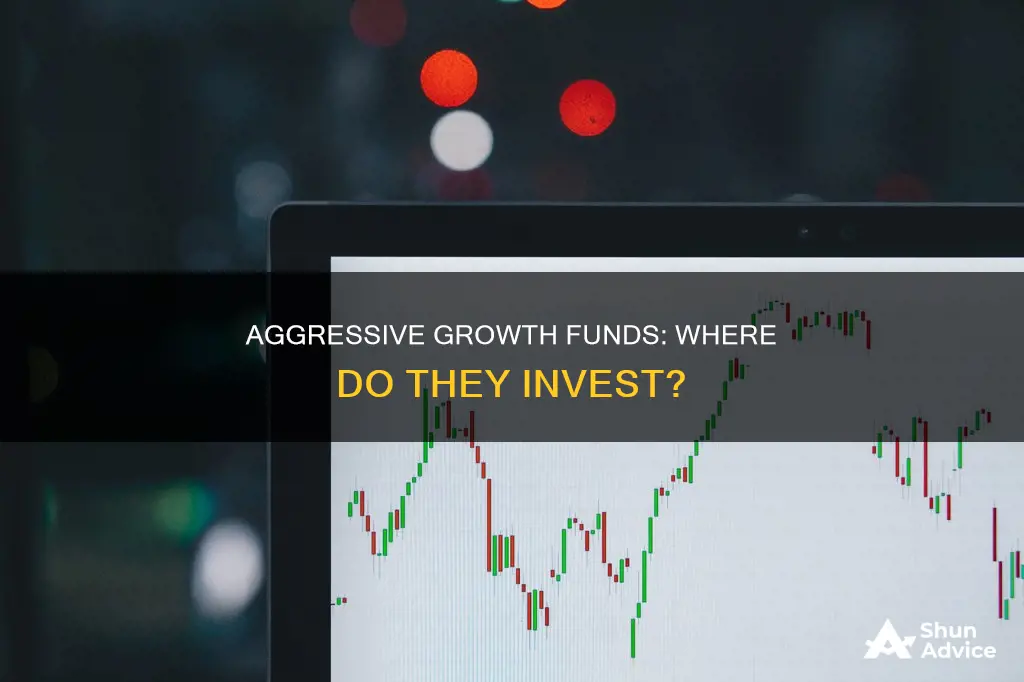
Aggressive growth funds are a type of mutual fund that seeks high capital gains by investing in high-risk, high-return stocks. These funds target companies with high growth potential, including newer companies and those in hot sectors of the economy. As a result, they offer the potential for above-average market returns but carry greater risk and volatility. This makes them more suitable for investors with a higher risk tolerance and longer time frames, such as younger investors.
| Characteristics | Values |
|---|---|
| Investment type | Mutual fund |
| Investment objective | High capital gain potential |
| Investment focus | Growth stocks |
| Risk level | High |
| Risk factors | Volatility, share price fluctuation, wide price volatility |
| Investor type | High-risk appetite, long-term investors, younger investors |
| Investment strategy | Actively managed, investing in newer companies, investing in hot sectors of the economy |
| Investment metrics | Beta, Sharpe Ratio, standard deviation |
What You'll Learn

High-risk/high-return stocks
Aggressive growth funds are a type of mutual fund that seeks high capital gains by investing in high-risk/high-return stocks. These funds target investors with a high-risk appetite and aim to deliver above-average market returns. The underlying investments tend to be volatile, leading to high share price volatility.
Aggressive growth funds focus on companies with high growth potential, including newer companies and those in rapidly expanding sectors of the economy. These funds are actively managed and aim to outperform standard growth funds by taking on more risk. The fund managers seek to increase portfolio value through capital appreciation.
As a high-risk investment strategy, aggressive growth funds can deliver strong gains during bull markets but may also suffer significant losses during bear markets. The wide price volatility inherent in the market for start-up companies and IPOs means that these funds may perform exceptionally well or poorly.
Aggressive growth funds typically invest in small- and mid-cap companies, as these businesses have ample room to grow over time. They also tend to invest in undervalued stocks, IPOs, and relatively volatile securities, aiming to profit from them during favourable economic conditions. The selection of securities is based on a company's potential for growth and profitability.
When considering investing in aggressive growth funds, it is crucial to closely examine the risk metrics, such as beta, Sharpe Ratio, and standard deviation, to make an informed decision. These funds are generally recommended to constitute a small portion of a diversified portfolio due to their high-risk nature.
Retirement Funds: Investing Wisely for Indians' Golden Years
You may want to see also

Start-ups and IPOs
Aggressive growth funds are a type of mutual fund that aims to achieve superior capital gains by investing in companies with high growth potential. These funds are characterised by their willingness to take on high-risk investments, such as start-ups and IPOs, to generate above-average market returns. While these investments carry greater risk, they also offer the potential for substantial profits.
Start-ups, particularly in the technology sector, have been a significant source of value creation and opportunity for investors since the Great Recession. However, many tech start-ups remain private, limiting their accessibility to public market investors. This is where aggressive growth funds come into play, as they provide an avenue for investors to gain exposure to these high-growth start-ups.
Initial Public Offerings (IPOs) are another key area of focus for aggressive growth funds. These funds may purchase a company's IPO shares and then sell them off quickly to generate substantial profits. While many mutual funds have rules against investing in IPOs, those with aggressive growth profiles actively invest in them. The Renaissance IPO ETF (IPO), for example, targets large, liquid, newly listed US IPOs and rebalances its portfolio each quarter.
Aggressive growth funds are well-suited for investors seeking returns higher than the market average. These funds typically outperform regular growth funds due to their focus on companies with aggressive growth projections and strategies. However, it is important to remember that these funds are highly volatile and are not suitable for risk-averse investors.
Investing in Your 20s: Index Funds for Early Investors
You may want to see also

Growth stocks
Aggressive growth funds that invest in growth stocks seek to provide above-average market returns. They do so by investing in companies with aggressive growth prospects and projections for revenue and earnings that are more ambitious than those of standard growth stocks.
Some examples of growth stocks that aggressive growth funds might invest in include:
- Common stocks of U.S. companies with prospects for rapid earnings growth
- Stocks of companies with market caps lower than thrice the weighted average market cap of the Russell 2000 Index
- Stocks of companies in the software and semiconductor industries
- Stocks of large, carefully selected companies
Mutual Fund Investment: Choosing the Right One
You may want to see also

Undervalued stocks
Aggressive growth funds are a type of mutual fund that seeks high capital gains by investing in high-risk/high-return stocks. These funds target companies with high growth potential, including newer companies and those in hot sectors of the economy. They are actively managed to achieve above-average returns during rising markets but may underperform in down markets due to their volatile nature.
Aggressive growth fund managers identify undervalued stocks by analysing a company's financial statements, industry position, and future growth potential. They aim to capitalise on the stock's potential for price appreciation as the market corrects and recognises its true value. This strategy aligns with the overall goal of aggressive growth funds, which is to generate substantial capital gains by taking on higher levels of risk.
In summary, undervalued stocks are an important consideration for aggressive growth funds. By investing in companies with stocks priced below their perceived value, these funds seek to generate substantial returns for investors. This strategy requires careful analysis and a tolerance for risk, as undervalued stocks may not always appreciate in value as anticipated.
Mid-Cap Funds: Smart Investment for Long-Term Growth
You may want to see also

Volatile securities
Aggressive growth funds are a type of mutual fund that seeks high capital gains by investing in high-risk/high-return stocks. These funds are designed for investors with a high-risk tolerance and a long-term investment horizon, typically targeting younger investors.
Aggressive growth funds invest in volatile securities, which are subject to wide price fluctuations. This volatility is due to the focus on start-up companies and initial public offerings (IPOs). These stocks are quickly purchased and sold by fund managers to capture short-term profits, which can be reinvested or distributed to investors. The high-risk nature of these funds means they perform well during bull markets but can suffer significant losses in bear markets.
The volatility of aggressive growth funds is measured by their beta, which is higher than 1.0, indicating greater responsiveness to market fluctuations. For example, if the market drops by 1%, an aggressive growth fund with a beta of 1.1 will lose 1.1%. This also works in the positive direction; a 1% market increase will result in a 1.1% gain for the fund.
To manage the risk, investors are advised to hold a diversified portfolio with only a small allocation to aggressive growth funds. It is crucial for investors to closely examine the risk metrics of these funds, such as beta, Sharpe Ratio, and standard deviation, to make informed decisions.
In summary, aggressive growth funds offer the potential for high returns but also carry significant risks due to their focus on volatile securities. These funds are suitable for investors seeking above-average returns who are comfortable with the associated volatility and potential for substantial losses.
Hedge Funds: Investing in Your Business and You
You may want to see also
Frequently asked questions
Aggressive growth funds are mutual funds that seek high capital gains by investing in the shares of high-growth company stocks. They are best suited for investors with a high-risk tolerance and longer time frames.
Aggressive growth funds invest in companies that have high growth potential, including newer companies and those in hot sectors of the economy. They invest in growth stocks with relatively more aggressive projections for revenue and earnings than standard growth stocks.
Examples of aggressive growth funds include Fidelity Select Technology, Vanguard Strategic Equity, and ClearBridge Aggressive Growth Fund.







